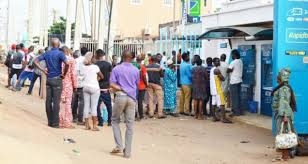- Point of Sale, PoS operators take over ATM business in South East Nigeria
- Bank customers attribute this to proximity, cash availability and convenience of PoS operators
- Bank officials advise customers, say patronizing PoS operators is prone to financial fraud
For the past three years now, Automated Teller Machines (ATMs) across South East zone have literally become redundant, inactive and virtually less used.
WITHIN NIGERIA findings showed that this is as a result of the business activities of the Point of Sale (PoS) across the zone, nay the country as a whole. The PoS operators across the zone have literally taken over the business of dispensing cash to the customers.
How it all started
Investigations by our reporter also showed that during the cash scarcity in the country in 2023, many Nigerians embraced electronic transfer of money instead of the old method of cash payment.
This also led to the increase in the number of number of PoS machines supplied across the zone.
This no doubt increased the number of employment opportunities for the operators in the zone.
According findings by our reporter, the number of PoS machines deployed by merchants and individuals across the country rose to 2.7 million in March this year, the Nigeria Inter-Bank Settlement System (NIBSS) disclosed in the latest electronic payment data released recently.

This according to NIBSS represents a 50 per cent increase year-on-year when compared with the number of deployed gallery in the same period last year, which was 1.8 million.
The March 2024 figure indicated that a total of 864,753 new PoS gallery were deployed last year.
However, the figure for deployed PoS is still lower than the total registered gallery.
According to the NIBSS data, a total of 3.730 million PoS machines had been registered across the country as of March 2024, which shows that a total of 1.04 million gallery are either yet to be deployed or have become inactive.
PoS transactions
The value of transactions over PoS gallery nationwide has been growing consistently over the years. However, data for March 2024 shows that there was a decline when compared with last year’s figure.
According to NIBSS data, the value of PoS transactions for March stood at N961.8 billion. This shows a 16.5 per cent decline compared with N1.15 trillion recorded in March 2023.
However, the record in March last year, when the PoS value hit an all-time high, is attributable to the unusual cash scarcity during the period, which forced many Nigerians to embrace electronic transactions.
Aside the 2023 cash scarcity, the growth of PoS transactions in Nigeria is being driven by many factors, which include rapid adoption by merchants for receiving payments.
Mobile money transactions in Nigeria jump to N17 trillion in Q1 2024 – NIBSS
In the same vein, there was also an upsurge in the electronic payments through mobile apps.
Mobile money operators (MMOs) in Nigeria, comprising the likes of OPay, Palmpay, Smartcash, and others, witnessed a surge in transactions in the first quarter of 2024, hitting N17.2 trillion.
According to data released by the Nigeria Inter-Bank Settlement Systems (NIBSS), the mobile money transactions figure for Q1 2024 represents an 89% year-on-year. growth when compared with the N9.1 trillion transactions recorded in the same period in 2023.
An analysis of the three-month data shows that mobile money transactions maintained steady growth each month.
In January, transactions valued at N5.2 trillion were recorded, and by February, mobile money deals shot up to N5.5 trillion, while the figure went up higher to N6.5 trillion in March.
Upsurge in E-payments
The surge in mobile money transactions is a reflection of the general upswing in e-payment in Nigeria in the first quarter of this year. According to NIBSS data, transactions across all electronic channels in the country increased by 89 % in Q1 2024 to N234 trillion.
Industry analysts believe that the surge in e-payment transactions can be linked to the recent cash crunch experience and the cashless policy of the Central Bank of Nigeria (CBN), which limited the amount of cash that can be withdrawn daily.
According to the revised cashless policy, which came into effect on January 9, 2023, cash withdrawal by an individual is limited to N500,000 a week, while corporate organizations have N5 million withdrawal limit within the same period.
Though the policy has been adjusted to daily instead of weekly, many Nigerians see electronic payment as more convenient than cash payment.
Mobile money operators in Nigeria
Mobile money operations in Nigeria are classified into two groups, according to the guidelines of the Central Bank of Nigeria. They include the bank-led and non-bank-led.
The bank-led operators are commercial banks licensed to provide mobile money services through their subsidiaries. On the other hand, non-bank-led operators are corporate organizations that have been duly licensed by the CBN to deliver mobile money services to customers. These exclude telecommunication companies, who are granted Payment Service Bank (PSB) licences.
WITHIN NIGERIA investigations showed that many factors contribute largely to the abandonment of ATMs gallery by Nigerians in preference to PoS operators.
One of such factors as revealed by some customers showed that many of such ATM points do not dispense especially during weekends.
Again, there is always long queues in those ATM points as many customers come there for different cash transactions like cash transfer, account enquiry and others.
Proximity factor is also another reason these gallery have become redundant due to lack of patronage.
However, when our reporter visited ATM points at Zenith bank, Nsukka, Enugu state, none of the six ATMs in the bank was dispensing cash.
At Fidelity bank, which few metres away from Zenith bank, out of the four ATM points, only one was functional, thereby making these customers to patronize PoS operators who are in front of these banks.
At Onitsha, Anambra state, one of the customers, Martins Onuora told WITHIN NIGERIA that he does not go to ATM to withdraw money because majority of the banks do not have cash to dispense to the customers.
According to Mr. Onuora, ” why should I go and waste my precious time in ATM when I can easily do transfer or withdraw any amount from PoS operators?
“Again, even if they have money, the long queues in these banks discourage one from going there. So, I prefer PoS operators to ATM points.”
Joseph Inyiam from Abakiliki also told our reporter in a telephone chat that for over a year, he has not visited any ATM points to withdraw money.
“I am a civil servant and I can’t imagine myself traveling to my bank or other ATM points to withdraw money or do transaction. If I must withdraw money, I usually go to PoS operators in my neighborhood to withdraw any amount I want. I don’t go to ATM because of cost of transportation and fear of being told that there is no money in those ATMs.”
However, in Imo State, the story is still the same as Onyebuchi Iwueze, an employee of state secondary school board told our reporter that ” I am equally a PoS operator. I established the business to augment my salary. I and many people in our area don’t go to banks or ATMs to withdraw. They rather come to me or other PoS operators to withdraw because of high cost of transportation to their respective banks.”
Bank officials speak to our reporter
Commercial bank officials are said to be aware of the current trend and as such see it as effects of technology advancement.
WITHIN NIGERIA reporter equally gathered many of such officials have keyed into the system and as a fact own major PoS outlets in the city.
However, speaking on the preponderance of PoS outlets, a branch manager of a new generation bank in Enugu, attributed the development to proximity and technology advancement.
“It is true that we are currently living in technology-driven activities but I will like to let you know that the PoS also has its own challenges.”
Explaining the challenges of PoS, the manager told WITHIN NIGERIA that “this is because lot of people are now being exposed to fraud and reconciliation during failed transactions that usually take longer periods than using the bank’s ATM,” he said.
“So it is a kind of comparative environment. I wish to state here that patronizing PoS terminals doesn’t mean people no longer go to the banks to do their transactions. It is just an alternative channel and it facilitates transactions.”
Stressing further, he said that “I don’t like monopoly in any way. Let everybody fight for their customers. The regulatory body should ensure that the turnaround time for return of failed transactions is real time, although banks have what we call ‘good faith’, where some customers are given money pending the time the system returns the amount that failed based on trust and confidence,” he said.
Another bank official told our reporter that “no matter what happens, customers will continue to demand for ATM cards. However, what we can truly say at this moment is that people may be using PoS machines to do their transactions rather than going to bank ATM machines”.
Explaining further, the official said that “recall that as a matter of fact, every cardholder has a primary account and the moment that bank is experiencing network issues, there is no PoS you can use that you will be able to obtain network because the ATM card works in tandem with bank services,” he said.
Mr. Cosmas Okoye, Access bank official said that “the issue has to do with convenience, proximity and affordability.”
Narrating further, Mr. Okoye queried, “Why will I take the stress or risk of going to the bank to collect N15,000 with transportation of between N600 and N1000, instead of just paying a PoS agent N200 without queue most times?. For me it makes more sense going to PoS operator than going to my bank in that regard.”
Why the situation will persist – Financial analyst
Ayokunle Olubunmi, a financial analyst said the ATMs have become mere “ornament” and they are rarely dispensing because of several factors.
He said, “First reason is the reduction in the appetite of holding cash, the amount of cash that you spend in a week has drastically reduced from four years ago, there are even weeks when a single naira will not pass through your pocket.
“One good part of the naira redesign last year is that almost everyone is adopting electronic transaction, even hawkers accept transfer.
“Another factor has to do with the cost of maintaining those ATMs, don’t forget that most of the ATMs are imported, because of the dollar, the cost of buying those ATM and maintaining them has skyrocketed. Unfortunately, there is a cap the CBN has put on the amount the bank can charge customers, such that by the time you speak to most banks, they will tell you that look, it is not a profitable venture for them,” he said.
He said while many people are moving towards the POS agents, the ATMs are still working.
“So it is not like the ATMs are no longer working but the amount of money posted to them is not like before. You will see that most banks after working hours, it might not work.
“In the medium and long term, we would still see the ATM, but we will also see the gradual de-emphasizing of the ATM, because of a lot of factors.
“As the payment system gets more effective and more Nigerians embrace it, you would see that the amount of cash that we need to run this economy will reduce significantly.
“In the far future, you will see a very low number of ATMs. You would agree with me that before, if you wanted to give someone money, what you used was cheque, but the volume of cheques in circulation has dropped significantly.
“However, it doesn’t mean that cheques have been eliminated because some banks still use middle clearing but it to an insignificant portion. I think that the ATMs would also go to that route, but that would be in the farthest future,” he said. using ATM to withdraw money since the advent of the new naira note in October 2022 when it became so hard to withdraw money from the ATM machines.




Discussion about this post